Employee by morning, tourist by afternoon: Why some Singaporeans are going on 'work-cations'
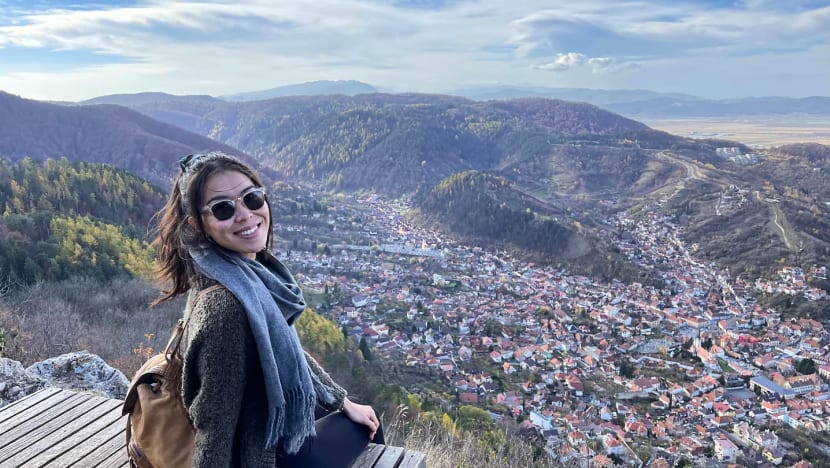
Cassandra Sim atop the Tampa, a mountain in Brasov, Romania in October 2021. (Photo: Cassandra Sim)
SINGAPORE: Like many Singaporeans, 30-year-old Cassandra Sim has been working from home for months amid the pandemic.
But unlike most Singaporeans, knocking off work for her means having the freedom to sail in the French Riviera, visit vineyards in Austria, hike up mountains in Romania and explore 13th-century church ruins in Estonia.
The freelance copywriter has been working from Europe for the past year, moving to a new city every few weeks or months.
“I can call it the best year of my life … I'm able to fulfil my dreams of travelling and seeing the world, feeling free, without losing the ability to continue my work,” said Ms Sim.
She first moved to Estonia to reunite with her American partner, with the country allowing both of them to work there for up to a year. But they decided to visit new cities after a few months.
Speaking to CNA from Sofia, Bulgaria, she explained that her work contracts with Singaporean firms still require her to work full-time – so she wakes up at around 4am in Europe and works until about noon or 1pm.
But after that, she is free to “seize the day” and visit attractions in the city she is in, or to simply enjoy the quotidian moments of living in a new country.
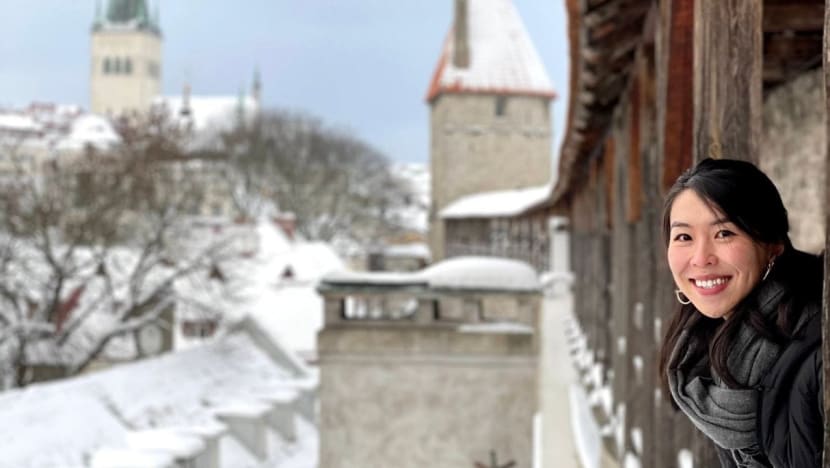
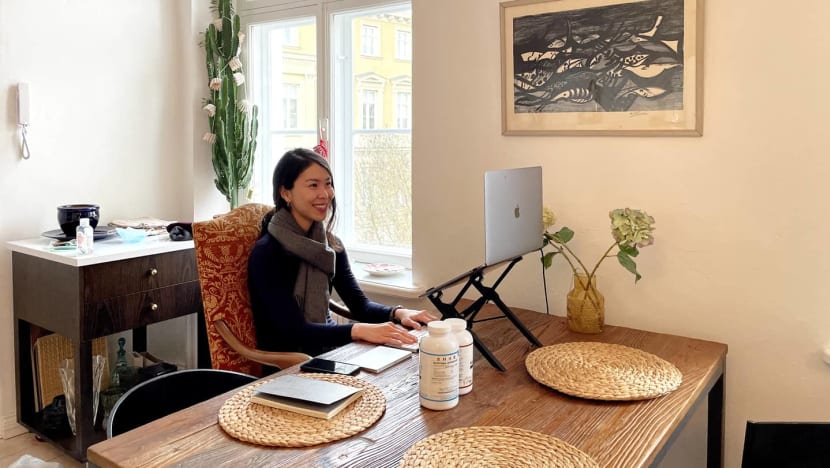
For someone who relishes new things, places, and people, the constant change has been deeply enriching, said Ms Sim.
On top of that, because “monotony collapses time”, the regular novelty has done quite the opposite.
“When I talk about January 2021, it feels like ages ago … This one year has felt so long and so fruitful for me that I feel very happy and satisfied with where my life is at this point … even though I could just be lying on the couch in my Airbnb doing nothing in Bulgaria.
“It’s a deep sense of ‘I'm living, not just going through the motions every day.’”
Ms Sim is among a group of Singaporeans who are taking work-from-anywhere to the next level, as remote working continues to be the default in the country.
This group includes full-time workers based in Singapore, who are travelling overseas for vacations and then extending their time there by working from that destination – combining the two into a “work-cation”.
EXTENDING A STAY OVERSEAS
Such is the case for a 27-year-old account manager in the tech industry, who only wanted to be known as Ms Tan.
Speaking to CNA from Rome, Italy, Ms Tan said she had planned to spend six weeks across Spain and Italy, of which two weeks would be for vacation, while the rest would be spent working remotely.
“The remote working part allows me to extend a trip, which I’d say is a little bit more valuable now that we are still stuck with these COVID travel regulations,” said Ms Tan, citing more testing requirements as an example.
“There are definitely more costs involved, so if you can sort of drag out a trip a little bit, that would be ideal.”

Getting the green light from her boss was not an issue, given that her company was already open to the idea of remote working, she said.
The timing works in her favour too. She starts work at about 6am in Europe, so her hours overlap with colleagues in the region and in Singapore.
Some of her favourite parts of the experience include getting to “chill at a different place”, people-watch, or understand new customs, she said.
“For me, it’s a long overdue vacation … It’s good for my mental health, I feel recharged, and feel like I can be back to Singapore for a bit longer before I feel the itch to (travel) again.”
A WELCOME CHANGE OF SCENERY
A 28-year-old senior art director, who only wanted to be known as Sabrina K, echoed this. She will be spending two months in Australia with her boyfriend, who returned to the country to visit his family.
As the year-end period is crunch time for the advertising industry, which she works in, she will only be taking a week of leave in January.
Nevertheless, she said the change of scenery is much needed. Speaking to CNA from Sydney, she said: “I travel to take a break away from all the stress, also to recharge my creative juices and seek inspiration elsewhere.
“For two years, we’ve been stuck at home with each other (working remotely) … so being able to finally escape from Singapore is a nice breather.”
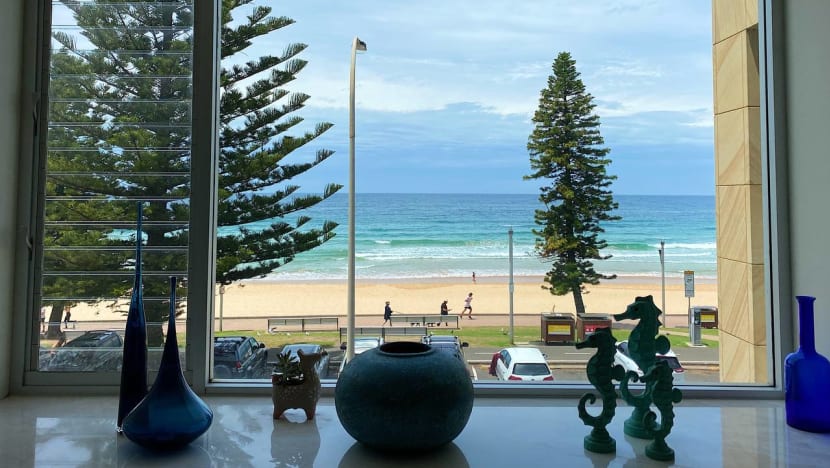
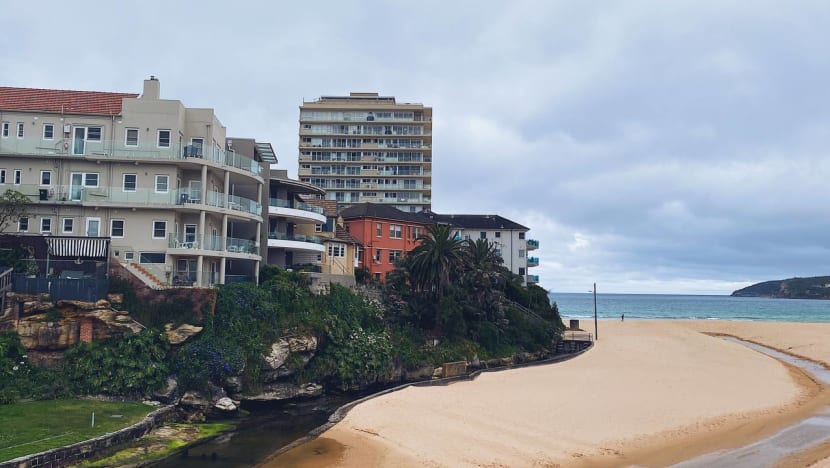
Though her work keeps her busy, some perks of being in Sydney include a picturesque beach view, many things to do and “a little semblance of normal life” before COVID hit.
Her bosses were supportive of the move and “well-prepared” for it, given that she isn’t the first employee to do this, added Ms Sabrina.
The arrangement also works because there is trust between her team members, she said. “In your own job, if you have a sense of accountability, there will be that trust. We didn't have to draw any form of contract. It was just a verbal agreement.”
SPURRED BY PANDEMIC
Mr Nilay Khandelwal, managing director of recruitment firm Michael Page Singapore, noted that the phenomenon is reminiscent of digital nomadism, an earlier trend that centred more around freelancers working from different locations.
The present work-from-anywhere phenomenon has since gained traction because of the pandemic, which has made flexible work locations and remote working “quite accepted”, he said.
“The threshold level has gone up that you can do the work remotely – now that remote can be in the same city, different city or a different country.”
One benefit for firms is that they have a wider talent pool. Having employees across time zones may also be beneficial for roles that require 24/7 support, he added.
For those who want to pursue such an arrangement, the most important step is to lay out the rules of engagement, said Mr Khandelwal. This includes deciding where, when and how often to communicate.
NOT SUSTAINABLE IN LONG HAUL
But there are limitations to consider, such as rules that limit the number of days an employee can work outside the country where the firm is being taxed, said Mr Khandelwal.
Beyond short-term stays, there may also be tax implications for the individual in Singapore and the other country, he added.
Ms Sim also believes this arrangement may not be sustainable in the long run. “One drawback is I feel I’m not really committing myself to my career 100 per cent. To climb the corporate ladder, somehow I feel like being physically in office will give you an advantage to rise up the ranks.
“When you’re so far removed from the entire team, it’s not as easy to reach that point. So I don't see myself doing this for the next five years.”
Logistical challenges may arise too, such as the struggle to find a stable Internet connection, noted Ms Tan.
Ms Sabrina added that being ahead of Singapore’s time zone also means meetings may drag into the night.
Mr Foo See Yang, country head of HR solutions firm PERSOLKELLY Singapore, also said that some firms’ lack of operational capabilities and experience to manage such an arrangement may hamper workers.
For instance, a lack of experience managing remote teams may mean slower or less support from headquarters, he added.
"A LIFE I KNOW THAT I'M HAPPY WITH"
Still, job seekers are increasingly evaluating work opportunities based on their contribution towards holistic wellness and career growth, Mr Foo said.
Their growing preference for flexible work arrangements has also become clearer.
Despite the struggles of working-from-anywhere, employees like Ms Sim say the move has been well worth the effort.
After visiting 10 countries in a year, while still drawing a regular salary, she said: "I feel that I am doing myself justice by doing what makes me happy ... leading a life that I know that I'm happy with."
BOOKMARK THIS: Our comprehensive coverage of the COVID-19 pandemic and its developments
Download our app or subscribe to our Telegram channel for the latest updates on the coronavirus pandemic: https://cna.asia/telegram
















